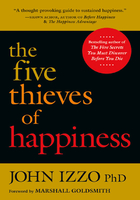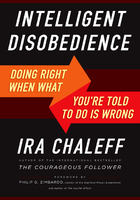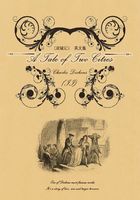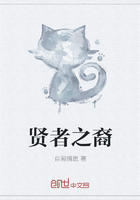Part 2
A Propos of the Wet Snow
When from dark error's subjugation My words of passionate exhortation Had wrenched thy fainting spirit free; And writhing prone in thine affliction Thou didst recall with malediction The vice that had encompassed thee: And when thy slumbering conscience, fretting By recollection's torturing flame, Thou didst reveal the hideous setting Of thy life's current ere I came: When suddenly I saw thee sicken, And weeping, hide thine anguished face, Revolted, maddened, horror-stricken, At memories of foul disgrace.
NEKRASSOV (translated by Juliet Soskice).
AT THAT TIME I was only twenty-four. My life was even then gloomy, ill- regulated, and as solitary as that of a savage. I made friends with no one and positively avoided talking, and buried myself more and more in my hole. At work in the office I never looked at anyone, and was perfectly well aware that my companions looked upon me, not only as a queer fellow, but even looked upon me—I always fancied this—with a sort of loathing. I sometimes wondered why it was that nobody except me fancied that he was looked upon with aversion? One of the clerks had a most repulsive, pock-marked face, which looked positively villainous. I believe I should not have dared to look at anyone with such an unsightly countenance. Another had such a very dirty old uniform that there was an unpleasant odour in his proximity. Yet not one of these gentlemen showed the slightest self-consciousness—either about their clothes or their countenance or their character in any way. Neither of them ever imagined that they were looked at with repulsion; if they had imagined it they would not have minded—so long as their superiors did not look at them in that way. It is clear to me now that, owing to my unbounded vanity and to the high standard I set for myself, I often looked at myself with furious discontent, which verged on loathing, and so I inwardly attributed the same feeling to everyone. I hated my face, for instance: I thought it disgusting, and even suspected that there was something base in my expression, and so every day when I turned up at the office I tried to behave as independently as possible, and to assume a lofty expression, so that I might not be suspected of being abject. "My face may be ugly," I thought, "but let it be lofty, expressive, and, above all, EXTREMELY intelligent." But I was positively and painfully certain that it was impossible for my countenance ever to express those qualities. And what was worst of all, I thought it actually stupid looking, and I would have been quite satisfied if I could have looked intelligent. In fact, I would even have put up with looking base if, at the same time, my face could have been thought strikingly intelligent.
Of course, I hated my fellow clerks one and all, and I despised them all, yet at the same time I was, as it were, afraid of them. In fact, it happened at times that I thought more highly of them than of myself. It somehow happened quite suddenly that I alternated between despising them and thinking them superior to myself. A cultivated and decent man cannot be vain without setting a fearfully high standard for himself, and without despising and almost hating himself at certain moments. But whether I despised them or thought them superior I dropped my eyes almost every time I met anyone. I even made experiments whether I could face so and so's looking at me, and I was always the first to drop my eyes. This worried me to distraction. I had a sickly dread, too, of being ridiculous, and so had a slavish passion for the conventional in everything external. I loved to fall into the common rut, and had a whole-hearted terror of any kind of eccentricity in myself. But how could I live up to it? I was morbidly sensitive as a man of our age should be. They were all stupid, and as like one another as so many sheep. Perhaps I was the only one in the office who fancied that I was a coward and a slave, and I fancied it just because I was more highly developed. But it was not only that I fancied it, it really was so. I was a coward and a slave. I say this without the slightest embarrassment. Every decent man of our age must be a coward and a slave. That is his normal condition. Of that I am firmly persuaded. He is made and constructed to that very end. And not only at the present time owing to some casual circumstances, but always, at all times, a decent man is bound to be a coward and a slave. It is the law of nature for all decent people all over the earth. If anyone of them happens to be valiant about something, he need not be comforted nor carried away by that; he would show the white feather just the same before something else. That is how it invariably and inevitably ends. Only donkeys and mules are valiant, and they only till they are pushed up to the wall. It is not worth while to pay attention to them for they really are of no consequence.
Another circumstance, too, worried me in those days: that there was no one like me and I was unlike anyone else. "I am alone and they are EVERYONE," I thought—and pondered.
From that it is evident that I was still a youngster.
The very opposite sometimes happened. It was loathsome sometimes to go to the office; things reached such a point that I often came home ill. But all at once, A PROPOS of nothing, there would come a phase of scepticism and indifference (everything happened in phases to me), and I would laugh myself at my intolerance and fastidiousness, I would reproach myself with being ROMANTIC. At one time I was unwilling to speak to anyone, while at other times I would not only talk, but go to the length of contemplating making friends with them. All my fastidiousness would suddenly, for no rhyme or reason, vanish. Who knows, perhaps I never had really had it, and it had simply been affected, and got out of books. I have not decided that question even now. Once I quite made friends with them, visited their homes, played preference, drank vodka, talked of promotions…. But here let me make a digression.
We Russians, speaking generally, have never had those foolish transcendental "romantics"—German, and still more French—on whom nothing produces any effect; if there were an earthquake, if all France perished at the barricades, they would still be the same, they would not even have the decency to affect a change, but would still go on singing their transcendental songs to the hour of their death, because they are fools. We, in Russia, have no fools; that is well known. That is what distinguishes us from foreign lands. Consequently these transcendental natures are not found amongst us in their pure form. The idea that they are is due to our "realistic" journalists and critics of that day, always on the look out for Kostanzhoglos and Uncle Pyotr Ivanitchs and foolishly accepting them as our ideal; they have slandered our romantics, taking them for the same transcendental sort as in Germany or France. On the contrary, the characteristics of our "romantics" are absolutely and directly opposed to the transcendental European type, and no European standard can be applied to them. (Allow me to make use of this word "romantic"—an old-fashioned and much respected word which has done good service and is familiar to all.) The characteristics of our romantic are to understand everything, TO SEE EVERYTHING AND TO SEE IT OFTEN INCOMPARABLY MORE CLEARLY THAN OUR MOST REALISTIC MINDS SEE IT; to refuse to accept anyone or anything, but at the same time not to despise anything; to give way, to yield, from policy; never to lose sight of a useful practical object (such as rent-free quarters at the government expense, pensions, decorations), to keep their eye on that object through all the enthusiasms and volumes of lyrical poems, and at the same time to preserve "the sublime and the beautiful" inviolate within them to the hour of their death, and to preserve themselves also, incidentally, like some precious jewel wrapped in cotton wool if only for the benefit of "the sublime and the beautiful." Our "romantic" is a man of great breadth and the greatest rogue of all our rogues, I assure you…. I can assure you from experience, indeed. Of course, that is, if he is intelligent. But what am I saying! The romantic is always intelligent, and I only meant to observe that although we have had foolish romantics they don't count, and they were only so because in the flower of their youth they degenerated into Germans, and to preserve their precious jewel more comfortably, settled somewhere out there—by preference in Weimar or the Black Forest.
I, for instance, genuinely despised my official work and did not openly abuse it simply because I was in it myself and got a salary for it. Anyway, take note, I did not openly abuse it. Our romantic would rather go out of his mind—a thing, however, which very rarely happens—than take to open abuse, unless he had some other career in view; and he is never kicked out. At most, they would take him to the lunatic asylum as "the King of Spain" if he should go very mad. But it is only the thin, fair people who go out of their minds in Russia. Innumerable "romantics" attain later in life to considerable rank in the service. Their many-sidedness is remarkable! And what a faculty they have for the most contradictory sensations! I was comforted by this thought even in those days, and I am of the same opinion now. That is why there are so many "broad natures" among us who never lose their ideal even in the depths of degradation; and though they never stir a finger for their ideal, though they are arrant thieves and knaves, yet they tearfully cherish their first ideal and are extraordinarily honest at heart. Yes, it is only among us that the most incorrigible rogue can be absolutely and loftily honest at heart without in the least ceasing to be a rogue. I repeat, our romantics, frequently, become such accomplished rascals (I use the term "rascals" affectionately), suddenly display such a sense of reality and practical knowledge that their bewildered superiors and the public generally can only ejaculate in amazement.
Their many-sidedness is really amazing, and goodness knows what it may develop into later on, and what the future has in store for us. It is not a poor material! I do not say this from any foolish or boastful patriotism. But I feel sure that you are again imagining that I am joking. Or perhaps it's just the contrary and you are convinced that I really think so. Anyway, gentlemen, I shall welcome both views as an honour and a special favour. And do forgive my digression.
I did not, of course, maintain friendly relations with my comrades and soon was at loggerheads with them, and in my youth and inexperience I even gave up bowing to them, as though I had cut off all relations. That, however, only happened to me once. As a rule, I was always alone.
In the first place I spent most of my time at home, reading. I tried to stifle all that was continually seething within me by means of external impressions. And the only external means I had was reading. Reading, of course, was a great help—exciting me, giving me pleasure and pain. But at times it bored me fearfully. One longed for movement in spite of everything, and I plunged all at once into dark, underground, loathsome vice of the pettiest kind. My wretched passions were acute, smarting, from my continual, sickly irritability I had hysterical impulses, with tears and convulsions. I had no resource except reading, that is, there was nothing in my surroundings which I could respect and which attracted me. I was overwhelmed with depression, too; I had an hysterical craving for incongruity and for contrast, and so I took to vice. I have not said all this to justify myself…. But, no! I am lying. I did want to justify myself. I make that little observation for my own benefit, gentlemen. I don't want to lie. I vowed to myself I would not.
And so, furtively, timidly, in solitude, at night, I indulged in filthy vice, with a feeling of shame which never deserted me, even at the most loathsome moments, and which at such moments nearly made me curse. Already even then I had my underground world in my soul. I was fearfully afraid of being seen, of being met, of being recognised. I visited various obscure haunts.
One night as I was passing a tavern I saw through a lighted window some gentlemen fighting with billiard cues, and saw one of them thrown out of the window. At other times I should have felt very much disgusted, but I was in such a mood at the time, that I actually envied the gentleman thrown out of the window—and I envied him so much that I even went into the tavern and into the billiard-room. "Perhaps," I thought, "I'll have a fight, too, and they'll throw me out of the window."
I was not drunk—but what is one to do—depression will drive a man to such a pitch of hysteria? But nothing happened. It seemed that I was not even equal to being thrown out of the window and I went away without having my fight.
An officer put me in my place from the first moment.
I was standing by the billiard-table and in my ignorance blocking up the way, and he wanted to pass; he took me by the shoulders and without a word—without a warning or explanation—moved me from where I was standing to another spot and passed by as though he had not noticed me. I could have forgiven blows, but I could not forgive his having moved me without noticing me.
Devil knows what I would have given for a real regular quarrel—a more decent, a more LITERARY one, so to speak. I had been treated like a fly. This officer was over six foot, while I was a spindly little fellow. But the quarrel was in my hands. I had only to protest and I certainly would have been thrown out of the window. But I changed my mind and preferred to beat a resentful retreat.
I went out of the tavern straight home, confused and troubled, and the next night I went out again with the same lewd intentions, still more furtively, abjectly and miserably than before, as it were, with tears in my eyes—but still I did go out again. Don't imagine, though, it was coward- ice made me slink away from the officer; I never have been a coward at heart, though I have always been a coward in action. Don't be in a hurry to laugh—I assure you I can explain it all.
Oh, if only that officer had been one of the sort who would consent to fight a duel! But no, he was one of those gentlemen (alas, long extinct!) who preferred fighting with cues or, like Gogol's Lieutenant Pirogov, appealing to the police. They did not fight duels and would have thought a duel with a civilian like me an utterly unseemly procedure in any case—and they looked upon the duel altogether as something impossible, something free-thinking and French. But they were quite ready to bully, especially when they were over six foot.
I did not slink away through cowardice, but through an unbounded vanity. I was afraid not of his six foot, not of getting a sound thrashing and being thrown out of the window; I should have had physical courage enough, I assure you; but I had not the moral courage. What I was afraid of was that everyone present, from the insolent marker down to the lowest little stinking, pimply clerk in a greasy collar, would jeer at me and fail to understand when I began to protest and to address them in literary language. For of the point of honour—not of honour, but of the point of honour (POINT D'HONNEUR)—one cannot speak among us except in literary language. You can't allude to the "point of honour" in ordinary language. I was fully convinced (the sense of reality, in spite of all my romanticism!) that they would all simply split their sides with laughter, and that the officer would not simply beat me, that is, without insulting me, but would certainly prod me in the back with his knee, kick me round the billiard- table, and only then perhaps have pity and drop me out of the window.
Of course, this trivial incident could not with me end in that. I often met that officer afterwards in the street and noticed him very carefully. I am not quite sure whether he recognised me, I imagine not; I judge from certain signs. But I—I stared at him with spite and hatred and so it went on?… for several years! My resentment grew even deeper with years. At first I began making stealthy inquiries about this officer. It was difficult for me to do so, for I knew no one. But one day I heard someone shout his surname in the street as I was following him at a distance, as though I were tied to him—and so I learnt his surname. Another time I followed him to his flat, and for ten kopecks learned from the porter where he lived, on which storey, whether he lived alone or with others, and so on—in fact, everything one could learn from a porter. One morning, though I had never tried my hand with the pen, it suddenly occurred to me to write a satire on this officer in the form of a novel which would unmask his villainy. I wrote the novel with relish. I did unmask his villainy, I even exaggerated it; at first I so altered his surname that it could easily be recognised, but on second thoughts I changed it, and sent the story to the OTETCHESTVENNIYA ZAPISKI. But at that time such attacks were not the fashion and my story was not printed. That was a great vexation to me.
Sometimes I was positively choked with resentment. At last I determined to challenge my enemy to a duel. I composed a splendid, charming letter to him, imploring him to apologise to me, and hinting rather plainly at a duel in case of refusal. The letter was so composed that if the officer had had the least understanding of the sublime and the beautiful he would certainly have flung himself on my neck and have offered me his friendship. And how fine that would have been! How we should have got on together! "He could have shielded me with his higher rank, while I could have improved his mind with my culture, and, well?… my ideas, and all sorts of things might have happened." Only fancy, this was two years after his insult to me, and my challenge would have been a ridiculous anachronism, in spite of all the ingenuity of my letter in disguising and explaining away the anachronism. But, thank God (to this day I thank the Almighty with tears in my eyes) I did not send the letter to him. Cold shivers run down my back when I think of what might have happened if I had sent it.
And all at once I revenged myself in the simplest way, by a stroke of genius! A brilliant thought suddenly dawned upon me. Sometimes on holidays I used to stroll along the sunny side of the Nevsky about four o'clock in the afternoon. Though it was hardly a stroll so much as a series of innumerable miseries, humiliations and resentments; but no doubt that was just what I wanted. I used to wriggle along in a most unseemly fashion, like an eel, continually moving aside to make way for generals, for officers of the guards and the hussars, or for ladies. At such minutes there used to be a convulsive twinge at my heart, and I used to feel hot all down my back at the mere thought of the wretchedness of my attire, of the wretchedness and abjectness of my little scurrying figure. This was a regular martyrdom, a continual, intolerable humiliation at the thought, which passed into an incessant and direct sensation, that I was a mere fly in the eyes of all this world, a nasty, disgusting fly—more intelligent, more highly developed, more refined in feeling than any of them, of course—but a fly that was continually making way for everyone, insulted and injured by everyone. Why I inflicted this torture upon myself, why I went to the Nevsky, I don't know. I felt simply drawn there at every possible opportunity.
Already then I began to experience a rush of the enjoyment of which I spoke in the first chapter. After my affair with the officer I felt even more drawn there than before: it was on the Nevsky that I met him most frequently, there I could admire him. He, too, went there chiefly on holidays, He, too, turned out of his path for generals and persons of high rank, and he too, wriggled between them like an eel; but people, like me, or even better dressed than me, he simply walked over; he made straight for them as though there was nothing but empty space before him, and never, under any circumstances, turned aside. I gloated over my resentment watching him and?… always resentfully made way for him. It exasperated me that even in the street I could not be on an even footing with him.
"Why must you invariably be the first to move aside?" I kept asking myself in hysterical rage, waking up sometimes at three o'clock in the morning. "Why is it you and not he? There's no regulation about it; there's no written law. Let the making way be equal as it usually is when refined people meet; he moves half-way and you move half-way; you pass with mutual respect."
But that never happened, and I always moved aside, while he did not even notice my making way for him. And lo and behold a bright idea dawned upon me! "What," I thought, "if I meet him and don't move on one side? What if I don't move aside on purpose, even if I knock up against him? How would that be?" This audacious idea took such a hold on me that it gave me no peace. I was dreaming of it continually, horribly, and I purposely went more frequently to the Nevsky in order to picture more vividly how I should do it when I did do it. I was delighted. This intention seemed to me more and more practical and possible.
"Of course I shall not really push him," I thought, already more good- natured in my joy. "I will simply not turn aside, will run up against him, not very violently, but just shouldering each other—just as much as decency permits. I will push against him just as much as he pushes against me." At last I made up my mind completely. But my preparations took a great deal of time. To begin with, when I carried out my plan I should need to be looking rather more decent, and so I had to think of my get-up. "In case of emergency, if, for instance, there were any sort of public scandal (and the public there is of the most RECHERCHE: the Countess walks there; Prince D. walks there; all the literary world is there), I must be well dressed; that inspires respect and of itself puts us on an equal footing in the eyes of the society."
With this object I asked for some of my salary in advance, and bought at Tchurkin's a pair of black gloves and a decent hat. Black gloves seemed to me both more dignified and BON TON than the lemon-coloured ones which I had contemplated at first. "The colour is too gaudy, it looks as though one were trying to be conspicuous," and I did not take the lemon-coloured ones. I had got ready long beforehand a good shirt, with white bone studs; my overcoat was the only thing that held me back. The coat in itself was a very good one, it kept me warm; but it was wadded and it had a raccoon collar which was the height of vulgarity. I had to change the collar at any sacrifice, and to have a beaver one like an officer's. For this purpose I began visiting the Gostiny Dvor and after several attempts I pitched upon a piece of cheap German beaver. Though these German beavers soon grow shabby and look wretched, yet at first they look exceedingly well, and I only needed it for the occasion. I asked the price; even so, it was too expensive. After thinking it over thoroughly I decided to sell my raccoon collar. The rest of the money—a considerable sum for me, I decided to borrow from Anton Antonitch Syetotchkin, my immediate superior, an unassuming person, though grave and judicious. He never lent money to anyone, but I had, on entering the service, been specially recommended to him by an important personage who had got me my berth. I was horribly worried. To borrow from Anton Antonitch seemed to me monstrous and shameful. I did not sleep for two or three nights. Indeed, I did not sleep well at that time, I was in a fever; I had a vague sinking at my heart or else a sudden throbbing, throbbing, throbbing! Anton Antonitch was surprised at first, then he frowned, then he reflected, and did after all lend me the money, receiving from me a written authorisation to take from my salary a fortnight later the sum that he had lent me.
In this way everything was at last ready. The handsome beaver replaced the mean-looking raccoon, and I began by degrees to get to work. It would never have done to act offhand, at random; the plan had to be carried out skilfully, by degrees. But I must confess that after many efforts I began to despair: we simply could not run into each other. I made every preparation, I was quite determined—it seemed as though we should run into one another directly—and before I knew what I was doing I had stepped aside for him again and he had passed without noticing me. I even prayed as I approached him that God would grant me determination. One time I had made up my mind thoroughly, but it ended in my stumbling and falling at his feet because at the very last instant when I was six inches from him my courage failed me. He very calmly stepped over me, while I flew on one side like a ball. That night I was ill again, feverish and delirious.
And suddenly it ended most happily. The night before I had made up my mind not to carry out my fatal plan and to abandon it all, and with that object I went to the Nevsky for the last time, just to see how I would abandon it all. Suddenly, three paces from my enemy, I unexpectedly made up my mind—I closed my eyes, and we ran full tilt, shoulder to shoulder, against one another! I did not budge an inch and passed him on a perfectly equal footing! He did not even look round and pretended not to notice it; but he was only pretending, I am convinced of that. I am convinced of that to this day! Of course, I got the worst of it—he was stronger, but that was not the point. The point was that I had attained my object, I had kept up my dignity, I had not yielded a step, and had put myself publicly on an equal social footing with him. I returned home feeling that I was fully avenged for everything. I was delighted. I was triumphant and sang Italian arias. Of course, I will not describe to you what happened to me three days later; if you have read my first chapter you can guess for yourself. The officer was afterwards transferred; I have not seen him now for fourteen years. What is the dear fellow doing now? Whom is he walking over?















